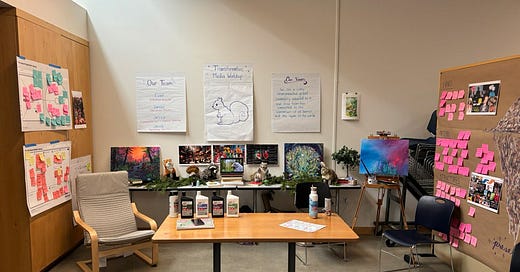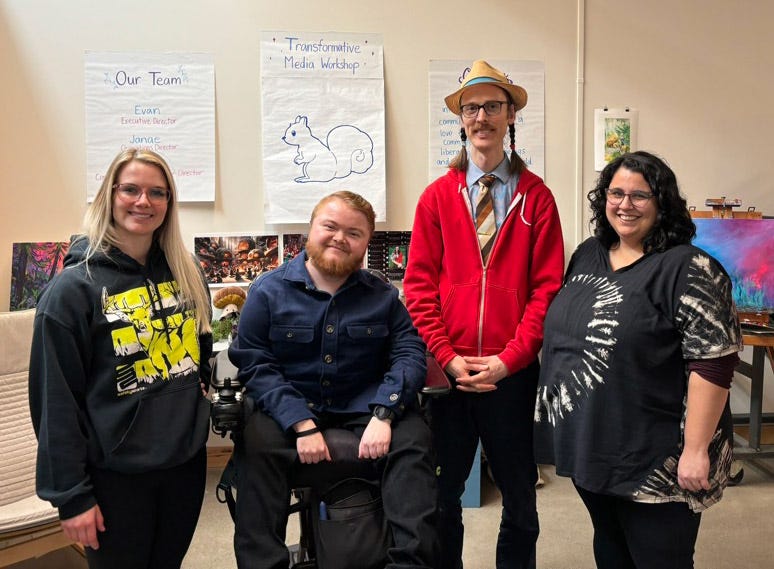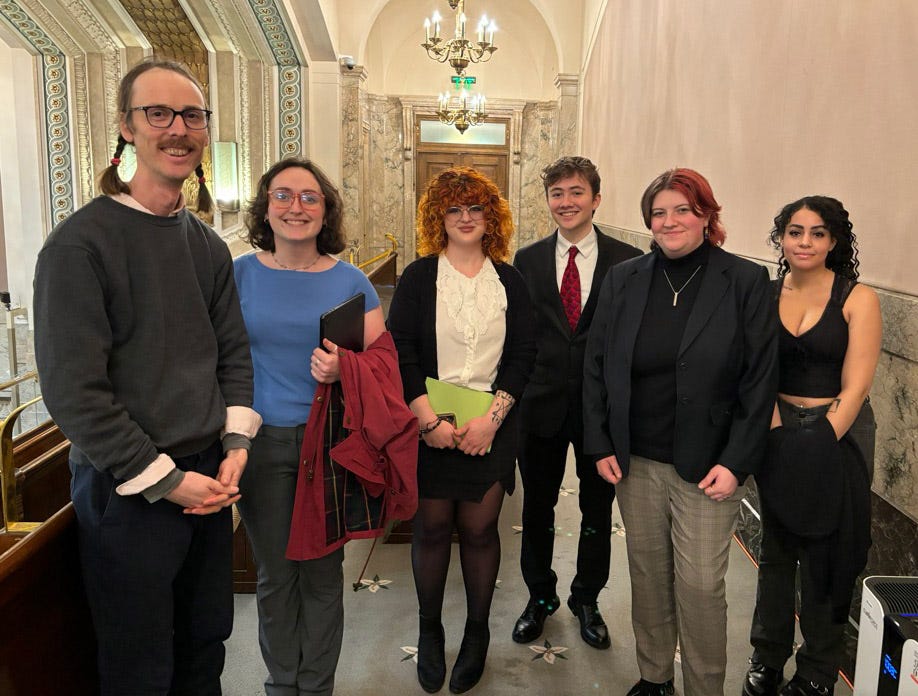I’m writing from the Changemakers Lab, my office space during the summer. It’s just me and the physical remnants of 40 or so collaborator-students: Their team workspaces, visioning and modeling canvases, and so many stickie notes.
Today I called the executive director of a national men’s grief organization, and a nurse at a local hospice organization. I’m deepening my “apprenticeship with grief,” as Francis Weller calls it, by developing a grief organization in the Changemakers Lab.
I recently completed a summer intensive in the lab. It was more a coaching circle than a class. We supported each other through group processes like case clinics, dialogue circles, and collaborative vision boarding.
As in every Evergreen class, we ended with narrative evaluations instead of grades. In the lab, we practice 360 evaluations, in which each student evaluates every member of their team. In my first quarters at Evergreen, the evaluations felt tepid, perfunctory. In my 4th quarter, we’ve gotten quite good at it.
There’s a concept in our curriculum, from MIT, about the four levels of listening. The deepest level is generative listening, in which the listener opens their entire being to the speaker, with the intent of serving the personal growth of the speaker. It reminds me of M. Scott Peck’s definition of love, which is “the will to extend one's self for the purpose of nurturing one's own or another's spiritual growth.”
In my evaluations of other students, I said things like:
“I think your challenge going forward is to dream bigger.”
“You are a powerful force for healing in the world.”
“It has been inspiring to watch you light up around your vision.”
And in their evaluations of me, they said things like:
“You are consistently encouraging others to be their best selves.”
“Your unwavering understanding and patience for others I take notes on, and thank you.”
“I believe in you.”
I’ve found in myself a relentless desire for the growth of those around me. It’s a coach consciousness I didn’t know I had. I discovered it in the lab. It’s one of the big gifts of my time here.
There’s much more to say, but for now I’ll pass along the note I sent to my Patreon and GoFundMe backers earlier this summer. It includes more reflections on my first year at Evergreen, and the actual text of my self evaluation.
Dear Supporters,
I wonder if you know how much you’ve lifted me. How much of my progress is because of the prevailing winds of your support.
Here’s an update on my efforts to commit to my vocational path.
I’ve spent the past nine months in the Changemakers Lab, an intensive collaborative entrepreneurship program at Evergreen State College. At the lab we are learning how to build collaborative “learning organizations.” But more importantly, we are learning how to become collaborative people. This second lesson has proven much more difficult for me. With the help of my classmates and faculty, I’ve seen my own limits as a collaborator in sharp relief. And I’ve grown considerably (and painfully).
The core of the program is vision work. We are taught how to discover and follow our own personal visions. Here’s the latest version of mine:
I am a collaborative leader in the global cultural movement towards healing and liberation.
I believe that disconnection is at the heart of the present crisis, underlying everything from addiction, to violence, to environmental destruction.
In service to the repair of our world, I am guiding human beings toward loving reconnection with self, with each other, and with the world. I do so through media projects that encourage reconnection to self, and community grief work that will tip the human world back towards life.
I am powered and guided by strong demanding love, by trust, by community, and by my faith in a loving world.
With our visions in hand, we are learning how to coalesce around group “shared visions.” These shared visions are the foundational north stars of the collaborative learning organizations that we build together.
There are student teams addressing everything from addiction, to veteran suicide, to financial education. I have 19-year-old classmates who have established 501(c)3 non-profits and LLCs. The pace of growth and learning is blistering and often overwhelming. Chaos and failure is everpresent, is encouraged even, in the service of our learning.
My road has been rocky, particularly as I learn how to be a collaborative human. I’m presently in summer session workshopping my efforts around transformative media and community grief work.
Trust is my mantra, and my biggest challenge. Often, I do not believe my vision, I don’t believe I can do it. That’s when I lean on my teammates, on their faith, their talents, their efforts.
The truth is I can’t do it. Not alone. No one can. And so I prepare for a second year in the Changemakers Lab, in the service of changing myself so that we can change the world, together.
###
Beyond vision, the other core tenet of the Changemakers Lab is the pursuit of revenue. I came into the program with my lifetime of resistance to the pursuit of money. It’s shifting for me as I focus on vision, and as I dream of hiring collaborators in the service of the repair of the world.
My online income through Patreon and other channels has dropped off over time, mirroring my loss of viewership due to changes in TikTok’s algorithm.
If you’d like to support my vision, you can do so on Patreon or Venmo and other platforms.
Thank you for walking with me.
Evan & Squirrel
Olympia
Summer 2024
###
And if you’d like to read a bit more about my experience at the lab, here is my Evergreen self-evaluation for year 1:
###
I engaged in the Changemakers Lab program at Evergreen to challenge myself in two areas where I have historically struggled: Team collaboration and business development.
Team Collaboration
The program was an intensive encounter with team entrepreneurship under the Tiimiakatemia model from Finland. I learned a theoretical grounding through the concepts of the knowledge creating company (Nonaka, Takeuchi), Senge’s learning organization model, and collaborative ideation and problem solving through the Presencing Institute and the MIT U-Lab program.
I practiced these theories throughout the course of the program in the in-class training team, three student-led project teams, and the MIT U-Lab online course. I undertook leadership roles on these teams, primarily in communications, community engagement, and team culture building.
I enthusiastically engaged the community in over 30 stakeholder visits, which placed me in the vanguard of community engagement within the program.
I brought in a wealth of lived experience from my own research, personal, and vocational work in mental health and trauma, community resiliency work, and media and communications.
I proved adept at taking a broad systems view of the curriculum and our collaborative activities, bringing a systems thinking perspective to every team I was party to.
I showed particular gifts in role modeling authenticity and vulnerability as a team member, especially for younger students and veterans. I engaged deeply in the concepts of Dialogue (Isaacs), becoming a dialogue coach for my teams and the program at large. I crafted and hosted workshops on dialogue techniques and team building at the team and program level throughout the year. Students frequently pointed to me as an exemplar of the good listener: Nonjudgmental, grounded, and kind.
A personal and collaborative high point of the program was my student team’s presentation to the Washington State legislature in fall 2023.
Business Development
On the business fundamentals side of the curriculum, the program was a crash course in strategic planning, systems thinking, design thinking, business modeling, and marketing.
During the course of the program I helped found a Washington State 501(c)3 non-profit, and served as Culture and Communications Director and Board Secretary. I learned and applied the basic tenets of Senge’s learning organization model, co-creating a knowledge-creating, flat organization with my team members. Together we learned and utilized strategic planning tools like iceberg models, and employed design thinking and iterative process in our efforts to find solutions to community problems.
As we developed our projects, we moved into business modeling, accounting, and marketing. Over the course of the program I co-developed several business models for endeavors around mental health and community wellbeing.
Conclusion, Next Steps
Overall I have never learned so much in so little time. I continue to integrate the lessons of the Changemakers Lab into my personal and vocational life. I look forward to further applying lab concepts to my endeavors as I continue with the lab into a fourth quarter. I plan to develop viable business models around community grief work and mental health videos, which I plan to carry into my life after Evergreen.





